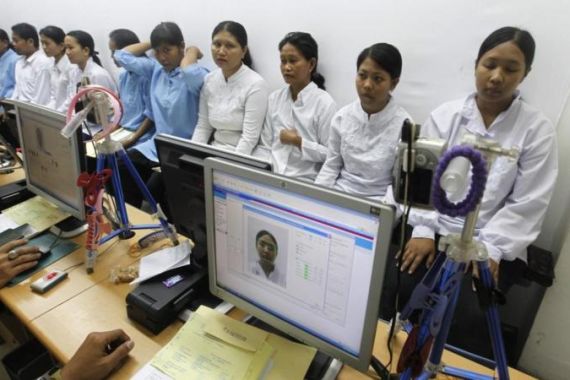Morocco’s maids: Abused and overworked
On International Migrants Day some foreign domestic workers in the Middle East say they are routinely abused.

Rabat, Morocco – Earlier this year, a group of Filipinos met in the headquarters of a workers’ union in the Moroccan capital to share their experiences and find solidarity with one another.
These maids, often recruited by wealthy families who want the prestige that comes with having an English-speaking nanny, say life far from home hasn’t been easy. They feel particularly vulnerable in a country where they don’t speak the language and where they aren’t protected by labour laws.
“[It’s] easy to live here if you find the good [employers],” said Tessi, 38, who works for a family in Rabat. “If you find the good, they are very good, and if you find the bad, they are very bad.”
The Moroccan government has recently acknowledged that it needs to address the problems of a growing migrant population, and even pledged to offer residency to some who are here illegally. A few weeks ago, the Indonesian consulate spoke out against the abuse of its domestic workers in Morocco, and Human Rights Watch released a detailed report last year urging Morocco to create a legal framework for maids. There are about 3,000 Filipinos in the country.
“What is happening in Morocco is a part of a broader pattern,” said Nisha Varia, senior researcher at the women’s division at Human Rights Watch. “A lot of them have to take out loans to pay for recruitment fees. They may be afraid to report the abuse because they have to make money to repay their recruitment fees at home.”
‘Abused by employers’
Many of these women are not paid what they were promised in the contract or they get physically abused or food deprived by their employers, and there is no oversight by the authorities.
Many of the domestic workers have complained about being deprived of food, overworked, not given a day off and even physically and sexually abused by their employers.
Hayat Baraho, a member of the Democratic Organisation of Workers, is one of the few people these women can turn to when in need of help. When domestic workers run away from abusive employers, many of them lack documents – their employers keep their passports as leverage to get back the money they paid the agency to hire them. While the maids are between jobs, some find themselves homeless. Baraho has welcomed them into her home due to a lack of shelters.
“When we asked the honourary consul of the Philippines in Morocco for a shelter for these women, he simply replied, ‘we don’t have any money’,” Baraho said. “Many of these women are not paid what they were promised in the contract or they get physically abused or food deprived by their employers, and there is no oversight by the authorities. Since their passports were confiscated, they’re stuck in Morocco.”
According to Varia, these women are particularly at risk because they do not speak the language and they do not know where to look for another job. In addition, they are afraid of being deported or detained. They are potentially easy targets for slavery and sex trafficking, human rights officials add.
The New York-based NGO insists that the Moroccan government needs to make sure that the country’s laws are applied equally to migrants. “Morocco is considering changing labour law to include domestic workers,” Varia said. “There is a conversation between governments and workers that really helped build an international consensus that this type of exploitation needs to be a part of the past.”
Earlier this year, the government pledged to look into the situation of illegal migrants and opened a Bureau for Foreigners. But there has yet to be a conversation about the status of domestic workers in a country that still faces big problems with child labour – especially with juvenile domestic workers.
“Girls are being exploited, abused, and forced to work long hours for extremely low wages,” said Jo Becker, children’s rights advocacy director at Human Rights Watch, in a 2012 report. “Morocco has taken important steps to reduce child labour, but it needs to take targeted actions to protect these child domestic workers and enforce the law.”
‘I just want to go home’
I never reported the rape because I knew no one would believe me. I want to go back home but my baby doesn't have a passport. So we are stuck here.
Baraho’s union also works to empower domestic workers to organise, to be aware of their rights, and to speak up against abuse. They also get help from their countrywomen who are in Morocco legally and are in a better financial situation. “We are asking the authorities to facilitate the return to the countries as long as there was no crime committed,” she said.
In the union’s meeting room, the group of women who managed to get a short break from their employers are animated when talking to Baraho, whom they call “madame”, about how to improve their lives. “The problem with the Filipino population in Morocco is a lack of solidarity among them, so we are teaching them to become stronger as a group,” Baraho said.
Among the group is a woman holding a baby – a product of rape in a country where sex outside of marriage is strictly forbidden by law.
Michelle, 36, from Manila, said she was raped by a taxi driver after she ran away from her employers two years ago. She now works for a family in Rabat while sharing a room with another Filipina, paying one-fifth of her salary to a woman to watch her baby while she is at work.
“I never reported the rape because I knew no one would believe me,” said Michelle. “I want to go back home but my baby doesn’t have a passport. So we are stuck here.”